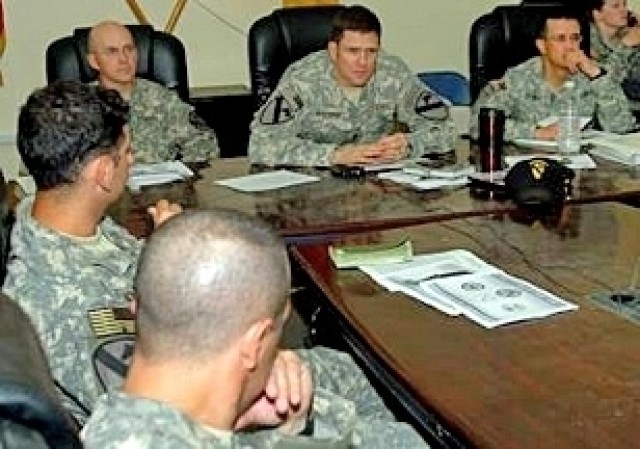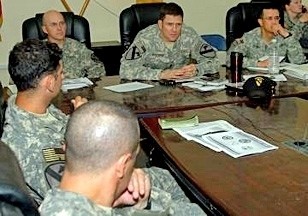CAMP TAJI, Iraq (Army News Service, July 9, 2007) - To help Iraqi local governments move to self-sufficiency, the 1st "Ironhorse" Brigade Combat Team, 1st Cavalry Division, is using expertise from the Austin, Texas, city manager's office to examine concepts of governance from the standpoint of a real, working local government model that may be applied to reconstruction efforts.
In a partnership that began prior to Operation Iraqi Freedom II, the brigade is taking advantage of a program formed by both the 1st Cavalry Division and the 4th Infantry Division to receive feedback and advice on how local governments operate through examples from the city of Austin.
The 1st BCT holds meetings and shares information with officials from the Austin office of city manager Toby Hammett Futrell, through video teleconferencing and conference calls. According to Lt. Col. Peter Andrysiak, deputy commanding officer, 1st BCT, 1st Cav. Div., having a real local government model for advice and a reach back capability is a boon to the Ironhorse Brigade's efforts in helping locally-elected Iraqi officials with governance issues.
"They're showing us great models that can be applied in teaching, coaching and mentoring local Iraqi governments," said Lt. Col. Andrysiak. "It's good to have professionals that do this every day, to advise us."
"We're focusing solely on policy-making and administrative aspects," he added. "Toby's team is showing us ideas that work, giving examples which they have used and saying 'here's something that we've used before and it works.'"
Lt. Col. Andrysiak explained that coalition forces are not trying to push Austin's structure of government onto local Iraqi governments.
"The Iraqis have their own system and we are working within that system with Austin leveraging their experience and processes. There are things inherent in government concepts that just work," he said, explaining that there are models in place within the realm of civics that are essential to the running of any government. "They can take the models and mold and adapt them to their own culture, and it doesn't have to be modeled after the American government."
Although the brigade has many experts from the State Department and the U.S. Agency for International Development on its Embedded Provincial Reconstruction Team, the partnership with Austin helps the brigade to fill in gaps where some of the ePRT experts may not have as much real on the ground experience within the structure of local government as opposed to national government or just dealing with concepts of government.
Col. Mike Bridges, the team leader for the ePRT governance team, has experience as a county commissioner for Nome, Alaska, and he welcomes the assistance that Austin is providing through reach back into expertise that is not on the team.
One of the things that has changed since the partnership with Austin began has been a shift in focus when it comes to approaching local governance in Iraq. In the past, said Lt. Col. Andrysiak, coalition forces helped the Iraqi governments in setting up city councils which would find out what the needs of the people were.
"The local councils would develop a list of projects without using a formal process, and we would deliver the project for them" he said, citing a health clinic as an example of the types of projects. But according to Lt. Col. Andrysiak, once built, because the construction of the clinic was not properly coordinated through the Ministry of Health, it did not have a trained staff or an operating budget.
"We approached a three-dimensional process in a one-dimensional way," Lt. Col. Andrysiak said. Local government is very dynamic with a large number of players, and we weren't helping the Iraqis leverage all the aspects of local government to make them self sufficient."
The missing piece of the puzzle was having the leadership team that could administrate the provision of services and the managing of technical staffs to, for example, run something like a local water or solid waste office/department. In essence, the role that a city manager or strong mayor would play in a similar local government in the United States was nearly nonexistent in local governments in Iraq.
Their structure has the positions and their staff requirements defined, but the positions go largely unfulfilled.
"We (the coalition) were acting in roles of the mayor and technical branch of government by delivering products and services to the people, which wasn't helping the local government become self-reliant," said Lt. Col. Andrysiak.
Now, a new emphasis has been placed, he said, on establishing a local qa'im makam or city manager/mayor who will work with city councils and oversee a technical branch of the government. The qa'im makam serves as an administrator and executor to manage technical services, bringing in technical experts in the fields of medicine, emergency services, water, electricity, waste management and other fields of expertise to deliver services to the people. The qa'im makam would also be in charge of such things as hiring, paying and firing people who work in these local technical departments.
Using a model similar to Austin's, the 1st BCT will focus on helping local government officials find ways to form committees and subcommittees. These will assist local governments in gaining the self-reliance they need to define their own community goals and objectives which will enable them to provide their own services to their people. The committees and subcommittees would tackle the issues of what kind of goals and objectives the city would want to pursue in an overall vision of their desired end state and use technical branch experts to pursue getting specific projects done, according to Lt. Col. Andrysiak.
Also boards, commissions, action groups and task forces made up of Iraqi citizens would be allowed to be part of the political process by having the opportunity to address issues brought up in committees and subcommittees prior to projects going forward and during the process.
Working closely with the people will be an integral part of the local governments achieving success, said Lt. Col. Andrysiak.
"As elected officials, they need to get out among the people and bring local citizens into the process," said Lt. Col. Andrysiak. "Under Saddam Hussein the people had no say in anything, so they may be a little hesitant to get involved in government."
However, the local governments under a city manager or qa'im makam working along with the city councils and technical branches will be much more representative of the people, according to Lt. Col. Andrysiak.
"They will see that when you take part in the (government) process, it benefits you the more you participate," he said, also explaining that Iraqi citizens will essentially be the voice behind their government with the ability to speak their opinions without fear of reprisals - giving them a much larger say in how their government operates.
Lt. Col. Andrysiak praised the help that the city of Austin has been giving to the 1st BCT as it in turn, works to help the Iraqi government.
"Austin is a great partner in this effort. They've been very gracious in hosting us in this process," said Lt. Col. Andrysiak. "They're a first-class team doing their part by giving of their own time to help us."




Social Sharing